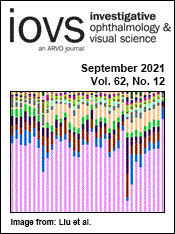
Authors: Bhubanananda Sahu; Laura Moreno Leon; Wei Zhang; Nikita Puranik; Ramesh Periasamy; Hemant Khanna; Michael Volkert. Investigative Ophgthalmology & Visual Science September 2021, Vol.62, 8.
ABSTRACT
Purpose: Oxidative stress is a major factor underlying many neurodegenerative diseases. However, antioxidant therapy has had mixed results, possibly because of its indiscriminate activity. The purpose of this study is to determine if the human OXR1 (hOXR1) antioxidant regulatory gene could protect neurons from oxidative stress and delay photoreceptor cell death.
Methods: The cone-like 661W cell line was transfected to stably express the hOXR1 gene. Oxidative stress was induced by the addition of hydrogen peroxide (H2O2). Intracellular levels of reactive oxygen species (ROS), caspase cleavage, and cellular resistance to oxidative stress were determined and compared between the control and hOXR1 cells. For in vivo analysis, AAV8-hOXR1 was injected subretinally into the rd1 mouse model of retinal degeneration. Functional and structural integrity of the photoreceptors were assessed using electroretinography (ERG), histology, and immunofluorescence analysis.
Results: Expression of hOXR1 increased cellular resistance and reduced ROS levels and caspase cleavage in the 661W cell line after H2O2 –induced oxidative stress. Subretinal injection of AAV8-hOXR1 in the rd1 mice improved their photoreceptor light response, expression and localization of photoreceptor-specific proteins, and delayed retinal degeneration.
Conclusions: Our results suggest that OXR1 is a potential therapy candidate for retinal degeneration. Because OXR1 targets oxidative stress, a common feature of many retinal degenerative diseases, it should be of therapeutic value to multiple retinal degenerative diseases.
Michael Volkert, PhD is a scientist at the University of Massachusetts Chan Medical School and a professor of Microbiology and Physiological Systems. He is also a member of the UMass Chan NeuroNexus Institute and the Advanced Ocular Therapy Program. The IRRF supported his project, Gene Therapy for the Treatment of Oxidative Stress-Induced Retinal Degeneration, the results of which contributed to this publication.
